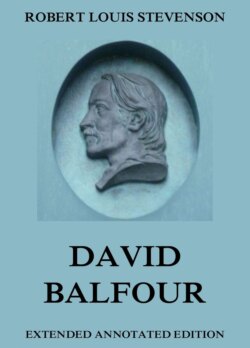David Balfour

Реклама. ООО «ЛитРес», ИНН: 7719571260.
Оглавление
Robert Louis Stevenson. David Balfour
Robert Louis Stevenson – A Biographical Primer
David Balfour. Dedication
Part I - The Lord Advocate. Chapter I
Chapter II
Chapter III
Chapter IV
Chapter V
Chapter VI
Chapter VII
Chapter VIII
Chapter IX
Chapter X
Chapter XI
Chapter XII
Chapter XIII
Chapter XIV
Chapter XV
Chapter XVI
Chapter XVII
Chapter XVIII
Chapter XX
Part II - Father And Daughter. Chapter XXI
Chapter XXII
Chapter XXIII
Chapter XXIV
Chapter XXV
Chapter XXVI
Chapter XXVIII
Chapter XXIX
Chapter XXX
CONCLUSION
Отрывок из книги
By Sidney Colvin
The Scottish novelist, essayist, poet, and traveller was born at 8 Howard Place, Edinburgh, on 13 Nov. 1850. He was baptised Robert Louis Balfour, but from about his eighteenth year dropped the use of the third christian name and changed the spelling of the second to Louis; signing thereafter Robert Louis in full, and being called always Louis by his family and intimate friends. On both sides of the house he was sprung from capable and cultivated stock. His father, Thomas Stevenson [q. v.], was a member of the distinguished Edinburgh firm of civil engineers [see under Stevenson, Robert; Stevenson, David; and Stevenson, Alan]. His mother was Margaret Isabella (d. 14 May 1897), youngest daughter of Lewis Balfour, for many years minister of the parish of Colinton in Midlothian, and grandson to James Balfour (1705–1795) [q. v.], professor at Edinburgh first of moral philosophy and afterwards of the law of nature and of nations. His mother's father was described by his grandson in the essay called ‘The Manse.’ Robert Louis was his parents' only child. His mother was subject in early and middle life to chest and nerve troubles, and her son may have inherited from her some of his constitutional weakness as well as of his intellectual vivacity and taste for letters. His health was infirm from the first. He suffered from frequent bronchial affections and acute nervous excitability, and in the autumn of 1858 was near dying of a gastric fever. In January 1853 his parents moved to No. 1 Inverleith Terrace, and in May 1857 to 17 Heriot Row, which continued to be their Edinburgh home until the father's death in 1887. Much of his time was also spent in the manse at Colinton on the water of Leith, the home of his maternal grandfather. If he suffered much as a child from the distresses, he also enjoyed to the full the pleasures, of imagination. He was eager in every kind of play, and made the most of all the amusements natural to an only child kept much indoors by ill-health. The child in him never died; and the zest with which in after life he would throw himself into the pursuits of children and young boys was on his own account as much as on theirs. This spirit is illustrated in the pieces which he wrote and published under the title ‘A Child's Garden of Verses,’ as well as in a number of retrospective essays and fragments referring with peculiar insight and freshness of memory to that period of life (‘Child's Play,’ ‘Notes of Childhood,’ ‘Rosa quo locorum,’ and others unpublished).
.....
"I am thinking nothing but that you are a good daughter," said I.
"I must not be without repaying it," she said; "where is it you stop?"
.....